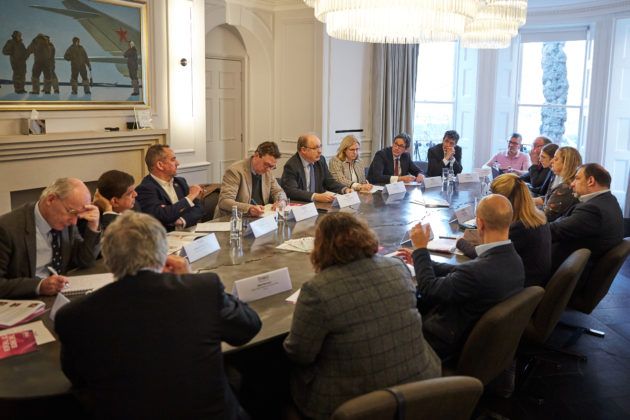Britain is one of the world leaders in technological and scientific research and innovation—but how can this be used to benefit to the country? Prospect convened a panel of experts to discuss the question of how innovation can help to seed economic growth and to ask what science can do for Britain. Sir Mark Walport, the Chief Executive of UK Research and Innovation, which is responsible for the public funding of new science research projects stressed that science should only ever be seen as part of a solution. “We need to define science in the broadest, natural philosophy sense,” he said. “If we are going to achieve the most we can,” he said, “we must humanise technology.” The UK has always been very good at this, he remarked, especially through the creative use of design. “We also do that through excellent regulation.” Walport went on to note that, economically, Britain is an uneven country. This unevenness exists within business sectors, where the gap between the least and most productive companies is wider in Britain than almost any other OECD country. There are also geographical disparities, and the question is what the best policies are to tackle that. And looming over all of this is the disruption caused by new communications technologies and Walport went on to outline what he termed “global disruptions,” such as “the extraordinary industrial revolution we are going through at the moment,” in engineering, which includes robotics and the life sciences and our understanding of the genome. These were accompanied by global challenges, of which the two greatest were population growth and the waste we produce, both visible and invisible. “The ingredients of science are relatively straightforward,” he said. “It’s about talent—about people. It’s about being global,” and Waport said that in his view the government was doing the right thing on visas to allow talented people to work in Britain. That issue will become increasingly significant as we detach further from the EU. The challenges ahead are so great, he said, that no single entity could hope to solve them. A challenge such as climate change, “can’t simply be done through the competitive engine of businesses,” he said. Government, business and the science establishment needed to cooperate more. Government, he said broadly shared that view. Andrew Jamieson of the Catapult network, recognised the significance of regional economic disparities. He has spent a lot of time working in offshore renewable energy—wind farms—and these are “naturally in areas where there has been social and economic deprivation for quite a long time.” Coastal communities have seen decline over many years and quite often voted for Brexit because they wanted to see change. The deployment of new technologies has to “be about jobs,” he said. And it’s got to be quick. Professor Sir Nilesh Samani of the British Heart Foundation, remarked on the importance of regulation, especially post-Brexit. Britain’s departure from the EU, while divisive, provides a “real opportunity,” for Britain to focus on new forms of regulation that would “bring inward investment into the UK.” While accepting the sensitivities involved in “I would very much welcome a focus on what the UK can do in this area.” Katherine Mathieson, Chief Executive of the British Science Association also highlighted the importance of developing a new regulatory regime to cover the use of new technologies, including autonomous systems and artificial intelligence, of the sort that would operate in driverless cars. She also highlighted a sense of frustration from business about the pace of change in climate change regulation and wondered whether the education system was responsible. “Young people are being forced to specialise very early,” she said, and this leads to too-narrow definitions of what science means. This puts people off becoming scientists. There is also a problem of finding enough maths teachers—the very success of the new technologically-based industries has created a huge number of attractive openings for people with maths qualifications, which are diverting would-be teachers into other careers. In a harsh irony, the success of new and innovative industries is leading to a shortage in the very people who will ultimately sustain those industries. Baroness Falkner, the Liberal Democrat peer, took the example of economics, and was critical of an excessive focus on the econometric approach that, as she saw it, focused too closely on modeling. This is a mistake—the process should also take account of the broader consequences of economic decisions and processes, she said. This echoed the remarks made earlier about a need to broaden the approach of the sciences, to incorporate a greater sense of their place in society. “The problem is that now you have tuition fees and there is so much that is vested in the job that you will get afterwards, people won’t take the long view when they are young.” On the plus side, she was confident that the appetite of venture capitalists for innovative, UK-based projects was still very strong. But, she said, “there is a dearth of ministers and policymakers with an understanding of science.” The same is true of the Civil Service, she said. Gary Elliott, CEO from the Aerospace Technology Institute agreed, but went one step further, “the point is just trying to be innovative in the way you do it, not just about the innovation itself, is really important. I’ve found this to be enormously successful to the extent that we’ve attracted companies from outside the UK to move here for a twelve-week programme around specific technologies [that we’re working with]. It’s enormously powerful.” Falkner closed with a remark that gave serious pause for thought. The majority of new technologies, which are the cause of such excitement, are not regarded as “job augmenting,” she said, but “job replacing.” The danger is that scientific progress could come to be seen as bringing a social cost that’s not worth paying. And if that happens, we’ll all lose out."
What can science do for Britain?
Harnessing the power of innovation
March 03, 2020







